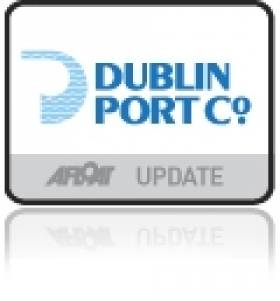Displaying items by tag: EastLink
Due to necessary maintenance works, the Thomas Clarke Bridge at Dublin Port will need to remain in the upright position overnight from 11pm tonight, Thursday 6 May until 6am tomorrow, Friday 7 May.
Dublin Port appeals for motorists to use alternate routes to cross the River Liffey during this time and apologises for any inconvenience these works may cause.
Up Close and Personal: New Boat Tours of Dublin Port
In addition to cruising this stretch of the River Liffey alongside the 'Docklands' quarter, the tour RIB boat will pass downriver through the East-Link toll bridge where visitors will get closer views of the variety of vessels and calling cruise liners from other ports throughout the world.
There will be five daily tours beginning at 10.00am, 12.00pm, 2.00pm, 4.00pm and 6.00pm.Tickets cost €15.00 for adults, €12.50 for students and the charge for senior citizens and children is €10.00.
In addition Sea Safari operate a 'River Liffey' only tour, a Dublin Bay 'North' and 'South' tours which visit Howth Head, Baily Lighthouse, Ireland's Eye and to Dalkey Island and Killiney Bay, where both bay tours provide a chance to spot local marine wildlife of seals, porpoises and sea birds.
- Rib
- Dublin Port
- Dublin Docklands
- Howth Head
- marine wildlife
- Cruise Liners
- Sea Safari Tours
- Dalkey Island
- Port of Dublin
- River Liffey
- Ports and Shipping News
- EastLink
- EastLink Toll Bridge
- Dublin Port news
- Baily Lighthouse
- Killiney Bay
- Seabirds
- Port of Dublin news
- RIBcraft
- M.V. Cill Airne
- Dublin Port cruise liners
- North Quay Wall Dublin
- Dublin Bay tours
- Ireland's Eye
Lecture: “A Hooker Evening with the Men from Kinvarra"
Poolbeg clubhouse overlooks the marina and faces the entrance to Alexandra Basin, where shipping activities of the commercial port can be viewed in closer detail.
To reach the clubhouse which is located on the South Bank, Pigeon House Road, Ringsend, take the Sean Moore Road that connects the Merrion Strand Road (from the south) and the East-Link Toll Bridge (if travelling from the northside).
For further information on the lectures to date click this link and in general about the DBOGA logon here. To contact the PYBC Tel: (01) 668 9983 or logon to www.poolbegmarina.ie/
The Dublin Bay Old Gaffers Association (DBOG) Winter /Spring lecture programme continues in the Poolbeg Yacht Boat Club & Marina (PYBC). with the next lecture: "The Installation, Operation and Maintenance of Marine Diesels". The lecture will be held on Tuesday, February 8th and the presenter is Sean Walsh (Yanmar Agent).
For further information on the DBOG lectures please contact Tim Magennis on 087 2593113. For information in general about the PYBC Tel: (01) 668 9983 or logon to www.poolbegmarina.ie/


























































